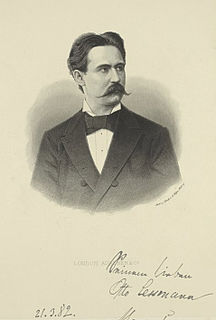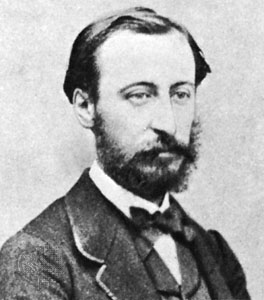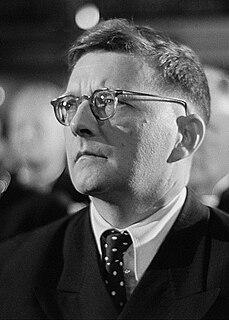
Theophil Franz Xaver Scharwenka was a German pianist, composer and teacher of Polish descent. He was the brother of Ludwig Philipp Scharwenka (1847–1917), who was also a composer and teacher of music.

Ignacy Jan Paderewski was a Polish pianist and composer who became a spokesman for Polish independence. In 1919, he was the new nation's Prime Minister and foreign minister during which he signed the Treaty of Versailles, which ended World War I.

Theodor Leschetizky (sometimes spelled Leschetitzky, Polish: Teodor Leszetycki; 22 June 1830 – 14 November 1915 was a Polish pianist, professor and composer born in Łańcut, then Landshut in the kingdom of Galicia and Lodomeria, also known as Austrian Poland, a crownland of the Habsburg monarchy.

Mendelssohn's Piano Concerto No. 1 in G minor, Op. 25, was written in 1830–31, around the same time as his fourth symphony ("Italian"), and premiered in Munich on 17 October 1831. This concerto was composed in Rome during a travel in Italy after the composer met the pianist Delphine von Schauroth in Munich. The concerto was dedicated to her. Mendelssohn attended one party after another in Munich in October 1831, the month of the premiere, but he also played chamber music and taught double counterpoint. He performed the piece himself at the premiere, which also included performances of his Symphony No. 1 and the Overture from Midsummer Night's Dream. He had already written a piano concerto in A minor with string accompaniment (1822) and two concertos with two pianos (1823–24).

Zygmunt Denis Antoni Jordan de Stojowski was a Polish pianist and composer.
The Piano Concerto No. 5 in F major, Op. 103, popularly known as The Egyptian, was Camille Saint-Saëns' last piano concerto. He wrote it in 1896, 20 years after his Fourth Piano Concerto, to play himself at his own Jubilee Concert on May 6 of that year. This concert celebrated the fiftieth anniversary of his début at the Salle Pleyel in 1846.

The Piano Concerto No. 4 in C minor, Op. 44 was composed by Camille Saint-Saëns in 1875. It was premièred on October 31, 1875, at the Théâtre du Châtelet of Paris, with the composer as the soloist. The concerto is dedicated to Anton Door, a professor of piano at the Vienna Conservatory. It continues to be one of Saint-Saëns' most popular piano concertos, second only to the Piano Concerto No. 2 in G minor.

Piano Concerto No. 2 in F major, Op. 102, by Dmitri Shostakovich was composed in 1957 for the 19th birthday of his son Maxim. Maxim premiered the piece during his graduation concert at the Moscow Conservatory. It contains many similar elements to Shostakovich's Concertino for Two Pianos: both works were written to be accessible for developing young pianists. It is an uncharacteristically cheerful piece, much more so than most of Shostakovich's works.
The Piano Concerto No. 4 in D minor, Op. 70, by Anton Rubinstein is a Romantic concerto that was once highly esteemed and was in the repertoire of the Russian and Polish piano virtuosos Sergei Rachmaninoff and Ignacy Jan Paderewski.

Jerzy Jan Maksymiuk is a Polish composer, pianist and orchestra conductor.

Pyotr Ilyich Tchaikovsky's Piano Concerto No. 3 in E-flat major, Op. posth. 75, was originally begun as a Symphony in E-flat. The composer ultimately abandoned this symphony, but, in 1893, started to rework it into a piano concerto, before abandoning all but the first movement, which he completed as a concert piece for piano and orchestra. It was published posthumously, in 1894, as a single-movement Allegro Brillante. The Symphony No. 6 Pathétique was the last of Tchaikovsky's compositions to be performed in his lifetime, but the Allegro Brillante, now known as the Piano Concerto No. 3, was his last completed composition.

The Andante and Finale is a composition for piano and orchestra that was reworked by Sergei Taneyev from sketches by Pyotr Ilyich Tchaikovsky for the abandoned latter movements of his single-movement Piano Concerto No. 3 in E-flat, Op. 75.
Jerzy "Jurek" Dybał is a Polish conductor and soloist double-bass. Since 2013, he is the director of the International Krzysztof Penderecki Festival in Zabrze, Poland. Since 2014, he is the director of orchestra at Sinfonietta Cracovia in Kraków.

The Piano Concerto in F sharp minor, Op. 20, is an early work of the Russian composer Alexander Scriabin (1872–1915). Written in 1896, when he was 24, it was his first work for orchestra and the only concerto he composed. Scriabin completed the concerto in only a few days in the fall of 1896, but did not finish the orchestration until the following May. Belyayev paid the composer 600 rubles ; it premiered in October 1897 and was finally published in 1898.

Józef Wieniawski was a Polish pianist, composer, conductor and teacher. He was born in Lublin, the younger brother of the famous violinist Henryk Wieniawski. After Franz Liszt, he was the first pianist to publicly perform all the études by Chopin. He appeared with Liszt in recitals in Paris, London, Copenhagen, Stockholm, Brussels, Leipzig and Amsterdam.
The Piano Concerto No. 1 in D major, Op. 17, by Camille Saint-Saëns was composed in 1858, when the composer was 23 and dedicated to Marie Jaëll. It is the first piano concerto ever written by a major French composer.
The Symphony in B minor "Polonia", Op. 24, was written by Ignacy Jan Paderewski between 1903 and 1908, and first publicly performed in 1909. Although he lived for another 32 years, the symphony was virtually Paderewski's last composition; he wrote only one more work before his death in 1941 - a hymn for male chorus in 1917. Around 1910, he commenced what would become a political career, culminating in becoming the first Prime Minister of independent Poland and signing the Treaty of Versailles on behalf of his nation in 1919. He later returned to the concert platform as a virtuoso pianist.
The Piano Concerto No. 3 in E minor "Ballade", Op. 60, was one of Nikolai Medtner's last major compositions, completed in 1943, when he was 63.

Jules Massenet's Piano Concerto is a 1902 work for piano solo and orchestra. It is scored for a typical-sized ensemble of the time. The concerto was performed in 1903 by Louis Diémer at the Conservatoire de Paris. After the premiere, it quickly fell into obscurity and is seldom heard today.
The Polish Fantasy in G sharp minor, Op.19, is a work for piano and orchestra composed in 1893 by Ignacy Jan Paderewski. It was first performed at the Norwich Festival in England the same year, where it achieved success and became a frequent addition to Paderewswki's concert repertoire. It is characterized by expressive themes, drawing influences from Polish folk music, and was often played by Paderewski at his concerts to remind audiences of the existence of then-occupied Poland.













